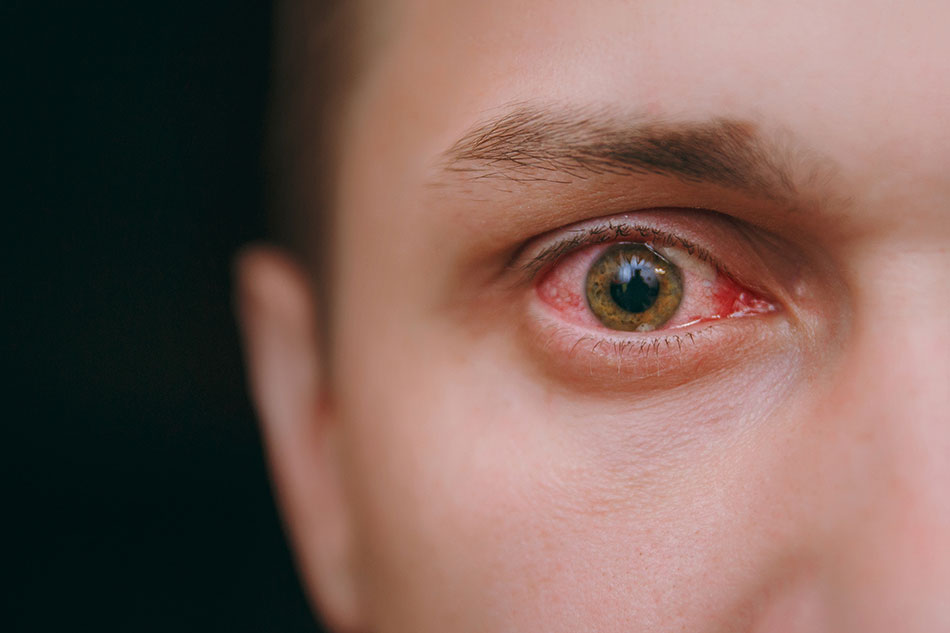When temperatures start to drop, protecting your eyesight may be the last thing on your mind. Unfortunately, your eyes can be damaged whether it’s 90 degrees outside or 5 degrees. Keep these four tips in mind this winter to avoid eye issues.
Don’t Ditch the Shades
Sunglasses do not just cut glare, but also protect your eyes from the damaging effects of ultraviolet (UV) light. Although your exposure to UV light may be less during the winter months, the sun’s rays can still cause short- and long-term vision problems. Both UVA and UVB waves can affect your vision. Long-term sun exposure can increase your risk of eventually developing cataracts or macular degeneration, a condition that destroys your central vision.
The more time you spend in the sun without protection, the greater the chance that you will develop skin cancer around your eyes. Since many people do not put sunscreen on their eyelids, this area is particularly susceptible to cancer.
Short-term vision damage can be a problem if you enjoy skiing, snowboarding, or other winter sports, or spend a lot of time outdoors when it snows. Snow reflects 80 percent of UV radiation, according to the World Health Organization. If you live in a high-altitude area or frequently vacation in mountainous areas, you are at increased risk of experiencing sun damage. The higher you go, the thinner the atmosphere becomes. When the atmosphere thins, it’s less effective in filtering UV rays. If you do not wear eye protection that blocks UVA and UVB rays, you may develop photokeratitis, a condition that causes pain, red eyes, sensitivity to light and tearing.
In addition to protecting your eyes from ultraviolet light, sunglasses also prevent your eyes from drying out from the effects of the wind and keep dirt and foreign objects from entering your eye.
Consider the Side View
Sunglasses can be very effective in reducing the effects of UV light on your eyes, but damaging rays can still enter your eyes at the sides of the glasses. For maximum protection, wear goggles or wraparound sunglasses. This type of eyewear will also protect your eyes from the effects of the wind and debris. Make sure the goggles or glasses you choose protect you against both UVA and UVB rays.
Become a Hat Person
Hats with brims can prevent as much as 50 percent of the sun’s rays from reaching your eyes, notes Prevent Blindness. Hats are particularly effective at blocking UV rays from penetrating the gap between the top of your sunglasses and your forehead.
Moisten the Air
The humidity level is naturally lower during the winter months. Unfortunately, the air becomes even drier due to furnaces, fireplaces, and heaters. Low humidity levels can irritate your eyes, particularly if you already suffer from dry eye. Using a humidifier will improve indoor moisture levels and reduce these problems. If you do notice dry, irritated eyes, try using artificial tears to alleviate the problem. Avoid getting close to outdoor fires and indoor fireplaces if your eyes tend to become dry when exposed to heat.
If you experience eye pain or irritation this winter, we can help. Call us if you have any winter eye problems or if it’s time for your next eye exam.
Everyone’s eyes feel irritated occasionally, but frequent irritation can be a sign of dry eye. You may be more likely to develop dry eye due to:
- Aging
- Side effects related to use of antidepressants, antihistamines, pain relievers, anxiety medications, and beta blockers.
- Wearing contact lenses for longer than recommended
- Diseases that affect tear production, such as Sjogren’s syndrome
- Living in a windy or dry climate
- Hormonal changes related to pregnancy or menopause
How is Dry Eye Treated?
Dry eye symptoms can often be relieved by over-the-counter artificial tears. If the product does not help you, your doctor may prescribe eye drops that increase tear production or decrease eye or eyelid inflammation. In severe cases, plugging the tear ducts or permanently blocking them with surgery may be recommended. Luckily, most people can benefit from using artificial tears when needed, wearing sunglasses year-round, and taking omega-3 fatty acids to increase tear production.
Sources:
Prevent Blindness: How to Protect Your Eyes from UV Rays
http://www.preventblindness.org/how-protect-your-eyes-uv-rays-0
World Health Organization: Ultraviolet Radiation and Health
http://www.who.int/uv/uv_and_health/en/
American Optometric Association: UV Protection
http://www.aoa.org/patients-and-public/caring-for-your-vision/uv-protection?sso=y
Journal of Clinical Ophthalmology: Ultraviolet Damage to the Eye Revisited, 12/19/13
https://www.ncbi.nlm.nih.gov/pmc/articles/PMC3872277/
University of Michigan Kellogg Eye Center: Dry Eye Syndrome
http://www.kellogg.umich.edu/patientcare/conditions/dry.eye.html
American Optometric Association: Dry Eye






